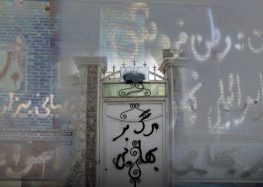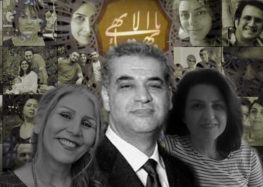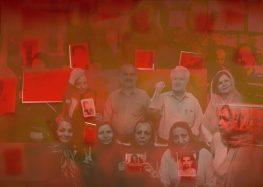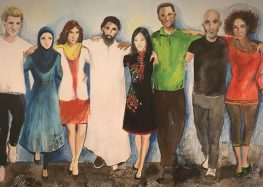Detainees Denied Basic Rights
Baha’is, AIDS Physicians, and Students charged with security crimes
(6 August 2008) The International Campaign for Human Rights in Iran strongly condemned violations of due process in judicial proceedings against several Baha’is, doctors and students who have been held in incommunicadodetention for months and recently charged with security crimes. The Campaign also expressed its serious concerns for the immediate health and safety of detainees.
On 2 August 2008, the deputy general prosecutor of Tehran, Hasan Hadad, told the Iranian Students News Agency that the detained students, two physicians, and seven Baha’i leaders are held in relation to security charges. He accused the seven Baha’i detainees of “connections with Israel,” the two AIDS physicians of “recruiting individuals to attend conferences abroad with the aim of overthrowing the system,” and the two student leaders of “communications with counter-revolutionary groups abroad.”“As long as these detainees are held in incommunicado detention, as long as they are deprived of access to their lawyers and families, and as long as no conclusive evidence is presented against them in a public court, there will be no justice delivered in their prosecution,” Hadi Ghaemi, a spokesperson for the Campaign said.
All of the detainees are held in Evin prison’s section 209. Section 209 is operated outside of the national prison system, and is under the control of Intelligence Ministry. Based on extensive interviews with former detainees in 209, intelligence agents regularly hold detainees in prolonged solitary confinement, subject them to torture, and apply tremendous physical and psychological pressures to obtain “confessions” before their cases are brought to a court.
“Mr. Hadad claims that all of these detainees have accepted the charges against them. After months ofincommunicado detention and complete lack of due process, these so-called ’confessions’ would lack any validity in a proper court of law,” Ghaemi said.
Six leading members of the Baha’i faith have been held in incommunicado detention since May 2008. They are all members of the Baha’i national coordination group, known as the “Friends.” Intelligence agents detained Fariba Kamalabadi, Jamaloddin Khanjani, Afif Naeimi, Saeid Rezaie, Behrouz Tavakkoli, and Vahid Tizfahm at their respective homes in the early morning of 14 May and conducted searches. Mahvash Sabet, the seventh member of the committee, has been in incommunicado detention since 5 March.
Regarding the detention of Baha’i leaders, Hassan Hadad told the Iranian Students News Agency that “Seven Baha’is formed an illegal group and had some connections with countries such as Israel and received orders from them to act against the system. This led to their detention and they have accepted all their charges, including connections with Israel.”
On 3 August 2008, the Baha’i International Community, responding to these allegations, rejected the charges, stating that “…the government knew perfectly well about the existence of this committee long before its members were arrested, just as the government knows perfectly well that these people are not involved in any underhanded activity.”
According to reports received by the Campaign, the “Friends” committee was in charge of logistical issues facing the Baha’i community, such as the burial of their members, and birth and death certificates. The Iranian government has indeed been aware of their legitimate activities prior to their detentions.
On 13 July 2008, Intelligence agents detained two leading members of the student organization, Office to Foster Unity, Bahareh Hedayat and Mohammad Hashemi. On 21 July 2008, the magistrate in charge of their interrogations, Matin Rasekh, announced the charges against Hedayat and Hashemi as “acting against national security.” State-controlled media had earlier reported the charges as “communications with counter-revolutionary groups abroad,” but Matin Rasekh denied these charges. Matin Rasekh even told the families of the detainees they should bring a libel suit against newspapers that reported such false news. However, the deputy general prosecutor, Hassan Hadad, repeated the charges against the detained students as “communications with counter-revolutionary groups,” and claimed they had accepted the charges. He also said the two students have been freed, but reports from Tehran indicate that they are still in detention. The authorities’ contradictory statements reinforce concerns that there is a serious lack of proper judicial process in the case, and that state agents are acting arbitrarily in holding them.
Two physicians, Arash and Kamiar Alaii , internationally renowned for their pioneering work in AIDS prevention, have been in incommunicado detention since 22 June. For the first time the authorities have confirmed their detention. With regard to their case, Hadad said: “They have been involved in organizing gatherings on topics such as AIDS that has received attention from domestic and international NGOs. They acted to recruit individuals to travel abroad with the aim of training them on overthrowing the system….they were well-aware of their activities and topics of trainings such as velvet revolutions.”
The International Campaign for Human Rights in Iran called on the Iranian government and the Judiciary to immediately release the detainees or to charge them in a proper public court with proper access to their lawyers.
“The international community will view these charges as politically motivated as long as there is no transparency or due process in a public court,” Hadi Ghaemi said.





